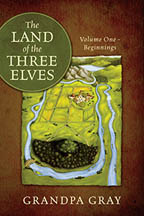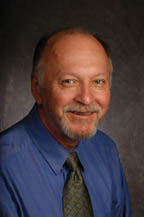Grandpa Gray
Biography
Grandpa Gray never thought he would tell children's stories. He wrote books and plays for adults and was a professor at a university. But when his grandchildren demanded stories, he said, "Once upon a time..." The next thing you know, there it was: The Land of the Three Elves.
Schedule
Will post information when available

The Land of Three Elves, Volume One: Beginnings
The Land of the Three Elves is a book with wide appeal. Do you want a book that gets kids reading and asking for more? Then you want Grandpa Gray's stories about the elves who live inside the curve of the river. Young children will enjoy hearing the stories read aloud and older children will enjoy reading them. Adults will find the stories, like the classic children's literature of the past, are a satisfying good read for them as well.
The book begins with a great river running to the sea. It curves and inside the curve of the river, there are elves. The Land of the Three Elves, Volume One starts you on a journey that you won't ever want to end.
The inhabitants and visitors to The Land of the Three Elves are an unforgettable cast of characters. There is the searcher, Surely Two Crows, half elf and half American Indian, whose full name is Surely Two Crows Aren't the Only Birds That Are Going To Land On That Tree.
Despite the fact that most of the characters in the stories are elves — and those who are not elves are gnomes, trolls, fairies or witches with a few humans thrown in for good measure — there is no hint of cuteness, preachiness or sentimentality anywhere. Instead, there is abundant wit, a good deal of marvelous adventure and a whopping good yarn.
There is nothing wrong with children's literature that attempts to instruct and uplift. The Land of the Three Elves often offers inspiring stories that are full of good advice and necessary truths. But really, what do kids want when they settle down on a cushion and open a book? They want a rousing good story with a few scary parts and maybe some magic.
Each story in The Land of the Three Elves can be read separately and stands on its own, but with each new story more is revealed about the geography, history and mythology of the land inside the river's curve.

Q&A
What is the most important lesson your readers can learn from your series, The Land of the Three Elves?
Elves are not perfect. They have flaws. They make mistakes. But there are some things elves just won’t do. They don’t whine. They don’t lie. Whining and lying are two things they just don’t understand. I hope my readers, especially my young readers, will begin to not understand them too.
Or maybe that’s not the most important lesson or at any rate it’s not the most fundamental. Maybe the most important lesson is that joy and understanding can be found on the next page. That’s the joy of reading. A reader feels an itch—what’s going to happen next? How is it all going to end? What’s the story?
Keep reading. You’ll find the answer on the next page.
What motivated you to tell these stories?
When my children were young I was in the habit of telling them bedtime stories. I told all the usual stories, all those classics that begin “Once upon a time.” Eventually I ran out and one night I said “Once upon a time” and had no idea what I was going to say next. And then I said it: “There were these elves. Their names were Salty, Alphonse, Sopping Wet and Popcorn.” It is a mystery to me where those names came from. The kids liked them though and demanded more. The next thing you know, I had created a whole world—The Land of the Three Elves inside the curve of that big river.
My ambition from the beginning (and it has remained) was to tell a whopping good tale. I didn’t want applause or praise or even money. What I wanted was to hear the kids say “Tell me another one, Daddy.”
My characters may be elves but they all have very recognizable human attributes. They can be lonely or shy. They can be afraid. They can want something very, very much. They get lost and find their own way. I wanted my readers to see and feel themselves in my stories.
One more thing. It is amazing how many children’s stories take place in a lovingly detailed location that feels a lot like a whole and complete world. Middle Earth. Never Never Land. Hogwart’s. I was motivated to create a place—a world—where young readers can feel comfortable, where they want to return again and again and explore all the nooks and crannies and be at home. What motivated me to tell these stories rather than some others? These stories all take place inside the curve of the river, a world I have come to love.
What was the most enjoyable part of the process of writing these stories?
I want to know what’s going to happen next too. I never seem to be comfortable. I sometimes think I have way too many stories to tell for the years left in my life. And sometimes I think (or fear) that I’ll never have another good idea again. The most enjoyable part of the process of writing these stories is the moment when once again I’m blindsided by a thought, “Hmm. That’s a good idea. That could be a story. Let’s see what could happen next.
What excites you about the festival?
I want to sell books. There, I said it. Complete honesty. I feel pretty confident that all the other writers are mostly excited for the same reason. Number two is closely related. It’s networking.
Making friends is good. Finding an agent or a publisher is better still.
Most writers (me too) seem to be pretty neurotic. I’ve been to writer’s conferences and festivals before and I have found myself alternately feeling superior to those wannabe writers who seem to be even more clueless than I am and feeling intense envy and resentment toward those writers who have lucked into a success greater than my own. It is a dizzying experience.
I have never been to a writer’s conference where I didn’t learn something. A name. A hint. A resource. Perhaps even something to improve my writing. I’m hoping (and excited by) the prospect of this festival continuing the streak. And, of course, I’m hoping to sell some books.
What should people look forward to by coming to your presentation at the festival?
I have a pet peeve about children’s books. I recognize the wisdom and practicality of writing books for pre-readers aimed at the needs and desires of babies and toddlers. I also recognize the wisdom and practicality of writing books for the slightly older child who is first learning to read. I even understand that the somewhat older child has interests and needs that can best be met by a writer who understands those interests and needs and does his best to meet them. BUT I firmly believe that as soon as possible, even surprisingly young children should be aspiring to and even succeeding at reading general books that are aimed at and enjoyed by adults.
There are many books today being written specifically for a narrow and carefully calibrated profile of an age based demographic. There is a careful use of vocabulary “appropriate” to the age and grade. There are themes and issues supposedly relevant to their concerns.
I don’t much like any of that. I think it’s better to read Mark Twain and Robert Louis Stevenson and Louisa May Alcott and so on. And me. My books for children defy all those carefully researched categories. What I like to say is that very young non-readers will enjoy hearing these stories read aloud. Somewhat older children will enjoy reading them for themselves. They might need some help here and there, but hey, what’s wrong with that? And guess what? Adults will like them too. That’s a pretty good description of Huckleberry Finn and Treasure Island and I would be very proud to have my books mentioned in the same sentence or even paragraph with those masterpieces.
Is there anything you would like to add?
What I most want to add is a big thank you for having this festival. As you well know, we writers are a lonely, needy lot who mostly scribble or tap out words in hopes of fame and fortune or at the very least just get someone to read what we’ve created. A festival is just what we need. We can brag and communicate. We can network and end up helping each other. We can get good ideas and most of all we can get inspired to go on and keep on writing. Keep it up. I’m looking forward to the festival.
Volunteer
Book-loving volunteers are essential to the Louisiana Book Festival's success. Whether it's escorting authors, guiding visitors, selling refreshments, working with children in the Young Readers Pavilion or other fun and rewarding assignments, the Louisiana Book Festival wants you to join the volunteer team.



